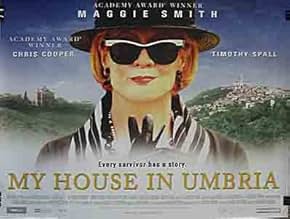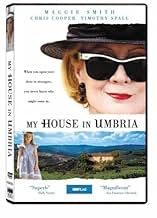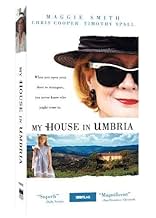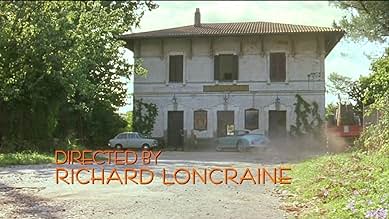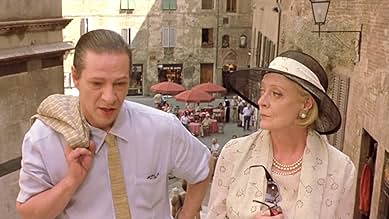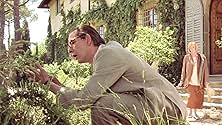IMDb RATING
6.9/10
3.8K
YOUR RATING
An unlikely group of people find solace and friendship after being thrown together in the wake of a terrorist attack.An unlikely group of people find solace and friendship after being thrown together in the wake of a terrorist attack.An unlikely group of people find solace and friendship after being thrown together in the wake of a terrorist attack.
- Director
- Writers
- Stars
- Won 1 Primetime Emmy
- 4 wins & 27 nominations total
Alison Cameron Adam
- General's Daughter
- (as Alison Adam)
Vittoria Colonna
- Young Woman
- (as Vittoria Colonna Di Stigliano)
- Director
- Writers
- All cast & crew
- Production, box office & more at IMDbPro
Featured reviews
This is quiet gem of a film. The storyline is basic, almost simplistic, but the direction allows the actors to add value where it counts.
Maggie Smith is delightful as the aged authoress, with a penchant for Grappa who, after a bomb explodes on a train, offer the survivors of her compartment, recuperation at her home in Umbria.
The Italian countryside is simply magnificent, the photography of Maggie Smith's villa and its surrounds(or should I say Mrs Delahunter's villa) gives a beautiful feeling of a somewhat tired place of residence for a somewhat tired individual, who has been there and done that but in a rather upper class British way. There are the usual disparate individuals coming to terms (or not?) with their their problems and then we have the police inspector, trying to suss whether any of the 'guests' can help. Unfortunately this aspect of the film, particularly the dealings with the police inspector, adds little and if anything detracts from the story. It is a necessary component but I feel could have been integrated better.
The supporting cast, particularly Ronnie Barker and Timothy Spall, add to the ambiance of the film and its quiet charm.
Why only seven out of ten? The direction I think is a little too light in that if it were not for the calibre of the actors, this might have been a poor 'B' Movie, but perhaps that is what the Director intended by letting good acting raise the film beyond its basic storyline.
This is now shown on TV, so give yourselves a treat, forget being a film reviewer and just soak up the acting and the atmosphere. If it is not on your local TV, it is worth renting for a night - just make sure you and you partner(it is essential that you and your partner watch this together) have a nice chilled glass of a sparkling Italian wine and indulge in quiet, but thoroughly pleasant entertainment.
Maggie Smith is delightful as the aged authoress, with a penchant for Grappa who, after a bomb explodes on a train, offer the survivors of her compartment, recuperation at her home in Umbria.
The Italian countryside is simply magnificent, the photography of Maggie Smith's villa and its surrounds(or should I say Mrs Delahunter's villa) gives a beautiful feeling of a somewhat tired place of residence for a somewhat tired individual, who has been there and done that but in a rather upper class British way. There are the usual disparate individuals coming to terms (or not?) with their their problems and then we have the police inspector, trying to suss whether any of the 'guests' can help. Unfortunately this aspect of the film, particularly the dealings with the police inspector, adds little and if anything detracts from the story. It is a necessary component but I feel could have been integrated better.
The supporting cast, particularly Ronnie Barker and Timothy Spall, add to the ambiance of the film and its quiet charm.
Why only seven out of ten? The direction I think is a little too light in that if it were not for the calibre of the actors, this might have been a poor 'B' Movie, but perhaps that is what the Director intended by letting good acting raise the film beyond its basic storyline.
This is now shown on TV, so give yourselves a treat, forget being a film reviewer and just soak up the acting and the atmosphere. If it is not on your local TV, it is worth renting for a night - just make sure you and you partner(it is essential that you and your partner watch this together) have a nice chilled glass of a sparkling Italian wine and indulge in quiet, but thoroughly pleasant entertainment.
10diane-34
Seeing Maggie Smith's character start the day with a wee glass of grappa and end her day with another is not exactly what we have come to expect from this marvelous actor but these twists in William Trevor's novella are precisely what the viewer is presented with throughout this wonderful film. My statement is in no way meant to denigrate the scrip-it simply is a signpost indicating the varied paths that the viewer follows as the film progresses.
The visual beauty of the film is taken for granted because of its magical setting-it's just the many little detours taken by the characters during the course of the unfolding drama that kept this poor viewer from anticipating the unfolding script changes. I saw a film I didn't quite expect to see because the early publicity seemed to gloss over these script changes. However, the resulting movie was better and more interesting than any I could have predicted-in part due to the remarkable acting of the cast.
Maggie's character is the mover of the film and all events revolve around her. Her character is strangely ambivalent in that she at first sight is this straight laced woman who appears to do everything "properly" but as the film unfolds she shows many more aspects to her role. For me it was similar to watching an onion being peeled and I found each underlying layer more interesting than the previous. Chris Cooper's character was also intrigued by this unfolding but he didn't find what he saw as interesting as I did.
Try to watch this lovely, interesting film-you can spend your time in a theater in far worse ways.
The visual beauty of the film is taken for granted because of its magical setting-it's just the many little detours taken by the characters during the course of the unfolding drama that kept this poor viewer from anticipating the unfolding script changes. I saw a film I didn't quite expect to see because the early publicity seemed to gloss over these script changes. However, the resulting movie was better and more interesting than any I could have predicted-in part due to the remarkable acting of the cast.
Maggie's character is the mover of the film and all events revolve around her. Her character is strangely ambivalent in that she at first sight is this straight laced woman who appears to do everything "properly" but as the film unfolds she shows many more aspects to her role. For me it was similar to watching an onion being peeled and I found each underlying layer more interesting than the previous. Chris Cooper's character was also intrigued by this unfolding but he didn't find what he saw as interesting as I did.
Try to watch this lovely, interesting film-you can spend your time in a theater in far worse ways.
The HBO TV movie "My House in Umbria" should be seen primarily for the complex and layered performance of divine Maggie Smith. As romance novelist Emily Delahunty, she projects an image of refinement and elegance that conceals a deeper, darker self. That self is revealed slowly, and we find hidden within a character that is not only at variance with Miss Delahunty's adopted persona, but also very different from the prim and proper ladies Maggie Smith habitually plays on the silver screen. We see that Miss Smith is capable even of being seductive and slatternly, most unlike her many repressed and spinsterish roles.
Maggie Smith has the kind of mesmerizing voice and marvelous diction that would enable her to entertain film audiences by reading the proverbial telephone book. I am reminded of Glenda Jackson's (virtual) one-woman show in "Stevie" and Joanne Woodward's voice-over of "The Age of Innocence".
The rest of the characters in "My House in Umbria" are, alas, a motley crew, sketched in only very lightly, merely second bananas to Maggie Smith's central figure. The time of the story is difficult to pin down based on the clothes and motor cars, but one imagines it takes place during the 1970s, the era of the Bader-Meinhof gang in Germany and the Red Brigades in Italy. The denouement is a little too pat, but the journey is still well worth our while.
One of the key questions raised in the film is what anger would drive a human being to commit an act of terror. But it becomes quickly apparent that political terrorism is not the only kind of "man's inhumanity to man" that is intended here. The focus is, rather, on innocence shattered and destroyed, the cruelty visited by individuals upon each other, the sense of guilt that it engenders, and the possibility of forgiveness and redemption that always, always exists if we "seize the day" and allow ourselves to be happy.
Maggie Smith has the kind of mesmerizing voice and marvelous diction that would enable her to entertain film audiences by reading the proverbial telephone book. I am reminded of Glenda Jackson's (virtual) one-woman show in "Stevie" and Joanne Woodward's voice-over of "The Age of Innocence".
The rest of the characters in "My House in Umbria" are, alas, a motley crew, sketched in only very lightly, merely second bananas to Maggie Smith's central figure. The time of the story is difficult to pin down based on the clothes and motor cars, but one imagines it takes place during the 1970s, the era of the Bader-Meinhof gang in Germany and the Red Brigades in Italy. The denouement is a little too pat, but the journey is still well worth our while.
One of the key questions raised in the film is what anger would drive a human being to commit an act of terror. But it becomes quickly apparent that political terrorism is not the only kind of "man's inhumanity to man" that is intended here. The focus is, rather, on innocence shattered and destroyed, the cruelty visited by individuals upon each other, the sense of guilt that it engenders, and the possibility of forgiveness and redemption that always, always exists if we "seize the day" and allow ourselves to be happy.
Sometimes it is good not to know much about a movie before watching it, so you won't have any prejudices. And it is sometimes even good to have wrong idea about what you're going to see, because you can be pleasantly surprised.
My House in Umbria sounded as it was happening on the beginning of 20th century, either in castle full of aristocrats (like Age of Innocence) or in deserted house with poor artists having no money to leave (Stealing Beauty; Sirens). Room with a View or Under Tuscan Sun came in mind too.
The train in first few minutes was obviously not a century old one. Characters were more likely to fit in Miss Marple story. And that was just a beginning of surprises.
A warm story about so different people that can successfully create a small community (instant family) is so hard to find. Unusual communities are usually shown as unstable group and intense interpersonal relations build the dynamic of group which develops the plot. (Tillsammans, Black Moon, Hair as an example.) But it is developing harmony that we see in House in Umbria, people who learn to lean on each other and help each other in the same time. Almost like an ideal early Christian community. Though religion isn't a topic of the movie, there are more Christian feelings here than in many religious movies. From loving and helping to forgiving. When one of the main characters appears to be the one guilty for all the tragedies that happened to the group, he isn't shown as a villain but rather a seduced man, a poor victim of circumstances.
The only person who is rather odd and doesn't fit is the only one that enters the movie after first five minutes (when we meet all other characters): another surprise - in an American (HBO!) movie the only person we dislike is the only (adult) American character in the movie (played incredible effectively by Chris Cooper as a superb contrast in cast). The interaction between him and the group is the only real conflict we see, and during that time our feelings towards him change. Finally we learn to accept him the way he is (as we should accept all people, says another message of the movie), because he is just that kind of man. He is not evil, he is just different. And, maybe as the only influence he was able to let himself implement, he makes an unexpected choice at the end, realizing that though this community is strange and odious to him, it's not necessary worthless, and it might be wrong forcing someone to replace this warmth and caring love with his scientifically precise but cold, emotionless world.
Something, however, didn't change from the beginning: Maggie Smith is still so Ms Marpleish that I was expecting at least one small murder which she could solve. And all people living in House in Umbria might have been imagined by Agatha Christie, actors (Barker, Spall, Dazzy, Cooper) ideal for Poirot's suspects and even Giannini as inspector could pass well as inspector Japp.
But at the end I didn't mind lack of murder. It was one of those rare TV movies that can be recommended to anyone who prefers emotions and peace instead of action and violence. It is not a soap opera, it is not cheesy; and don't let my words make you understand it is a religious movie: it is humanity in the first place that House in Umbria promotes.
My House in Umbria sounded as it was happening on the beginning of 20th century, either in castle full of aristocrats (like Age of Innocence) or in deserted house with poor artists having no money to leave (Stealing Beauty; Sirens). Room with a View or Under Tuscan Sun came in mind too.
The train in first few minutes was obviously not a century old one. Characters were more likely to fit in Miss Marple story. And that was just a beginning of surprises.
A warm story about so different people that can successfully create a small community (instant family) is so hard to find. Unusual communities are usually shown as unstable group and intense interpersonal relations build the dynamic of group which develops the plot. (Tillsammans, Black Moon, Hair as an example.) But it is developing harmony that we see in House in Umbria, people who learn to lean on each other and help each other in the same time. Almost like an ideal early Christian community. Though religion isn't a topic of the movie, there are more Christian feelings here than in many religious movies. From loving and helping to forgiving. When one of the main characters appears to be the one guilty for all the tragedies that happened to the group, he isn't shown as a villain but rather a seduced man, a poor victim of circumstances.
The only person who is rather odd and doesn't fit is the only one that enters the movie after first five minutes (when we meet all other characters): another surprise - in an American (HBO!) movie the only person we dislike is the only (adult) American character in the movie (played incredible effectively by Chris Cooper as a superb contrast in cast). The interaction between him and the group is the only real conflict we see, and during that time our feelings towards him change. Finally we learn to accept him the way he is (as we should accept all people, says another message of the movie), because he is just that kind of man. He is not evil, he is just different. And, maybe as the only influence he was able to let himself implement, he makes an unexpected choice at the end, realizing that though this community is strange and odious to him, it's not necessary worthless, and it might be wrong forcing someone to replace this warmth and caring love with his scientifically precise but cold, emotionless world.
Something, however, didn't change from the beginning: Maggie Smith is still so Ms Marpleish that I was expecting at least one small murder which she could solve. And all people living in House in Umbria might have been imagined by Agatha Christie, actors (Barker, Spall, Dazzy, Cooper) ideal for Poirot's suspects and even Giannini as inspector could pass well as inspector Japp.
But at the end I didn't mind lack of murder. It was one of those rare TV movies that can be recommended to anyone who prefers emotions and peace instead of action and violence. It is not a soap opera, it is not cheesy; and don't let my words make you understand it is a religious movie: it is humanity in the first place that House in Umbria promotes.
Having just seen this film in the cinema, I have to say it didn't flag at all, and it was graced by one of Maggie Smith's greatest performances - and which fully deserved her Emmy award. The film dramatises the necessary illusions with which we need to live our lives. For Emily Delahunty, alcohol and the escapism of the romance fiction she writes are the props to her very existence. To keep sane the illusion of happiness sometimes is necessary to keep going. And yet, out of tragedy comes the hint of salvation: some kind of family, and a girl who becomes a symbol of how she can have hope for the future. This is not a cosy film, as some misguided critics have labelled it. It is not gardens, Italy, cups of tea: it is a film of illusion, escapism, isolation and the human spirit in the face of tragedy and death. Released in the UK after the quaint "Ladies in Lavender" it was unfortunately seen by the critics as exactly the same kind of film - and so missing the point completely.
Playing the troubled alcoholic, a vulnerable ageing romance novelist, Smith is on amazing form. Never mannered, she is perfect in her second role in a William Trevor novella (her first was in the 1984 "Mrs Silly" for ITV in the UK, for which she was nominated for a BAFTA). Using those expressive eyes, and a crushed, occasionally slurred voice, she draws you into the film. If this makes me sound like a Smith groupie, I have to point out that I disliked intensely this actress's mannered caricatures in such films as "Tea with Mussolini" or "Washington Square" (though, faced with the awful scripts, maybe she decided just to push it for laughs...). That is why she deserves recognition for this film: she reminds us that, with the right material, she can be the best - and not just the witty old bat in "Gosford Park" or the the stern teacher in "Harry Potter". After Smith's Emmy award, it was criminal that Meryl Streep robbed Dame Maggie at the Golden Globes for her raiding of the dressing-up box in "Angels in America".
For the supporting cast, Ronnie Barker, Timothy Spall, and Chris Cooper are all superb: understated, natural, and working in a brilliant ensemble. They have such rapport with Smith that the film just whizzes by.
Playing the troubled alcoholic, a vulnerable ageing romance novelist, Smith is on amazing form. Never mannered, she is perfect in her second role in a William Trevor novella (her first was in the 1984 "Mrs Silly" for ITV in the UK, for which she was nominated for a BAFTA). Using those expressive eyes, and a crushed, occasionally slurred voice, she draws you into the film. If this makes me sound like a Smith groupie, I have to point out that I disliked intensely this actress's mannered caricatures in such films as "Tea with Mussolini" or "Washington Square" (though, faced with the awful scripts, maybe she decided just to push it for laughs...). That is why she deserves recognition for this film: she reminds us that, with the right material, she can be the best - and not just the witty old bat in "Gosford Park" or the the stern teacher in "Harry Potter". After Smith's Emmy award, it was criminal that Meryl Streep robbed Dame Maggie at the Golden Globes for her raiding of the dressing-up box in "Angels in America".
For the supporting cast, Ronnie Barker, Timothy Spall, and Chris Cooper are all superb: understated, natural, and working in a brilliant ensemble. They have such rapport with Smith that the film just whizzes by.
Did you know
- TriviaMrs. Emily Delahunty's (Dame Maggie Smith's) car is an Alfa Romeo 6C-2500, produced between 1947 and 1953. It is a five-seat touring car popular with affluent post-war customers interested in a sporty yet comfortable vehicle.
- Quotes
Mrs. Emily Delahunty: In the garden, delphiniums were in flower. Through scented twilight, the girl in the white dress walked with a step as light as a morning cobweb. That evening she hadn't a care in the world.
Details
- Release date
- Countries of origin
- Official site
- Languages
- Also known as
- Mitt hus i Umbrien
- Filming locations
- Production companies
- See more company credits at IMDbPro
Box office
- Gross worldwide
- $1,324,900
- Runtime1 hour 43 minutes
- Color
- Sound mix
- Aspect ratio
- 1.85 : 1
Contribute to this page
Suggest an edit or add missing content


